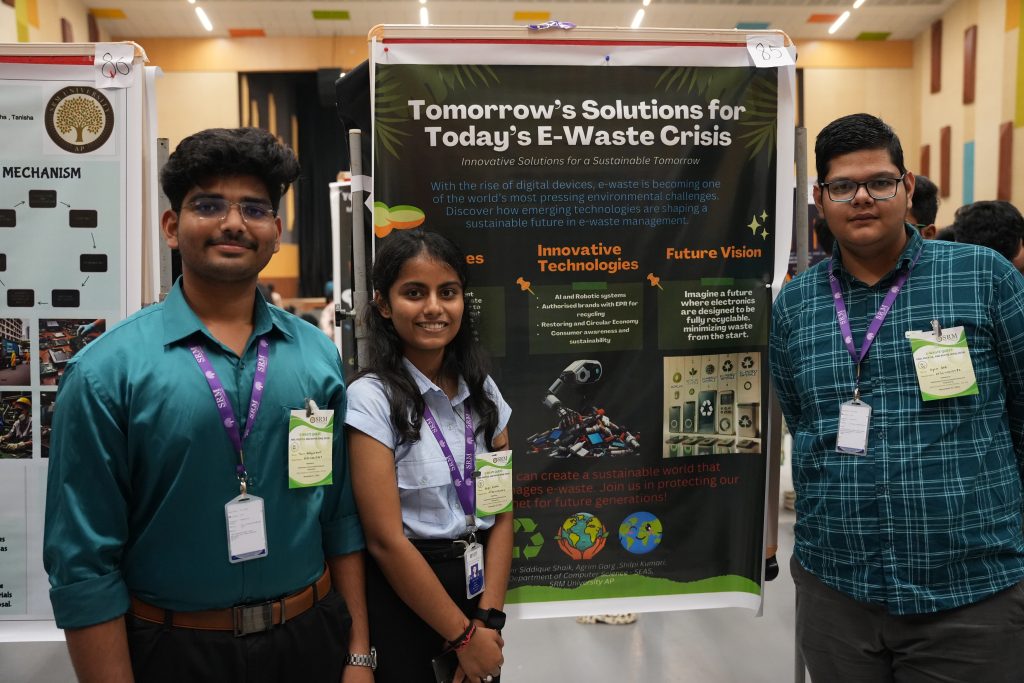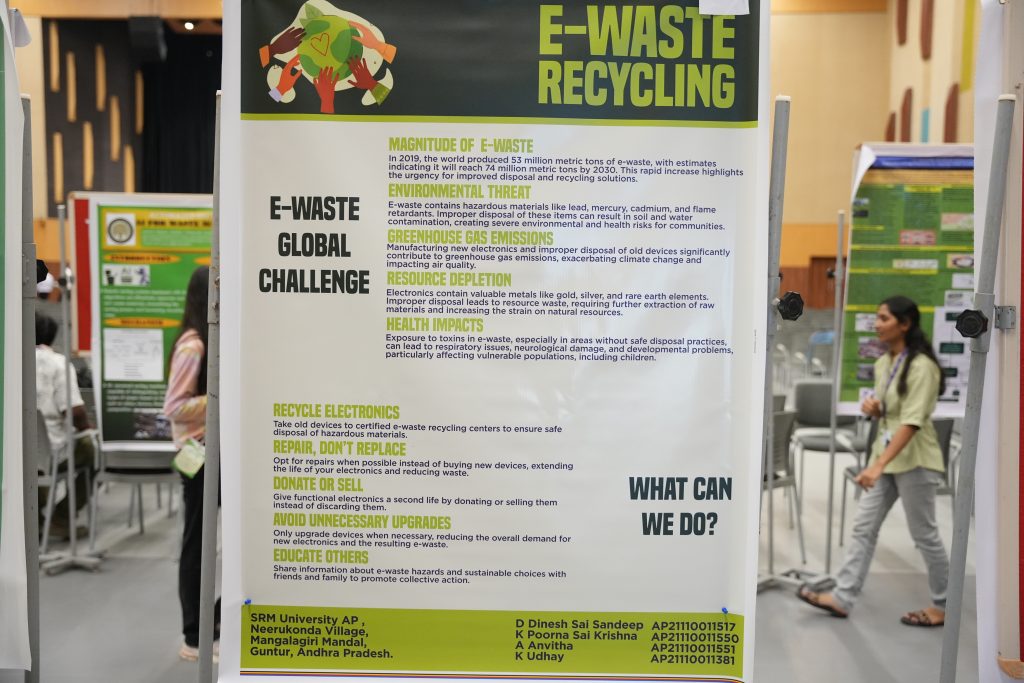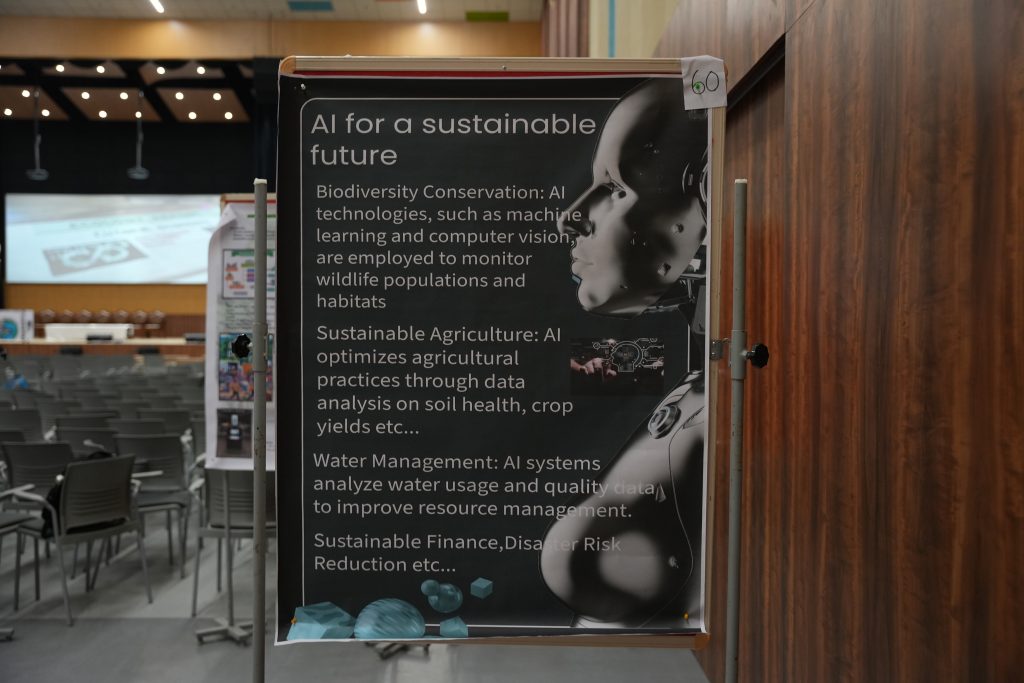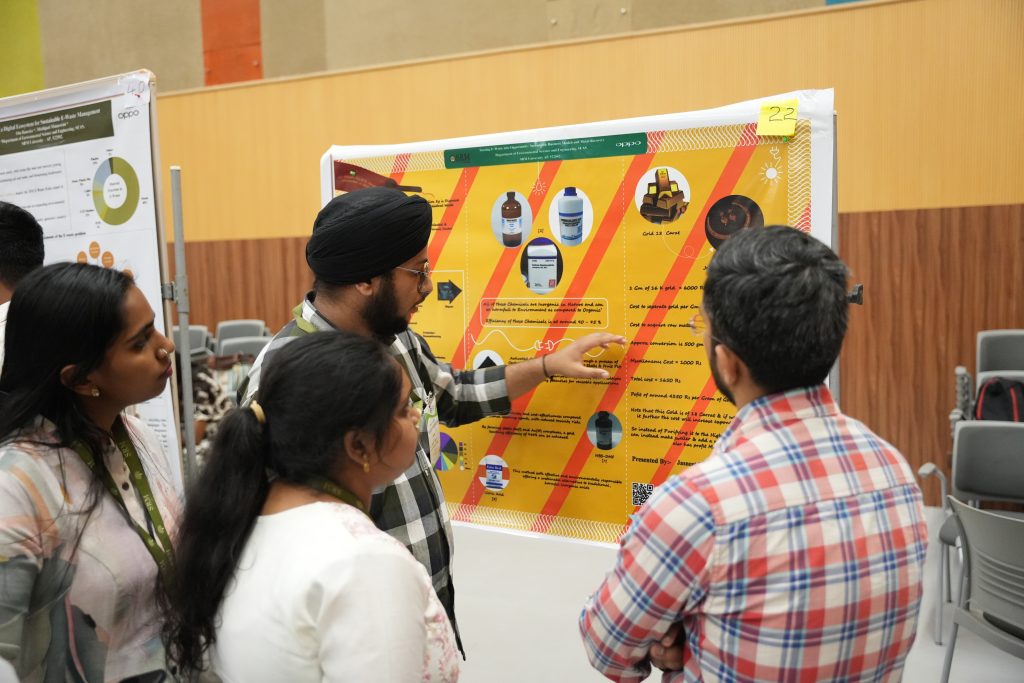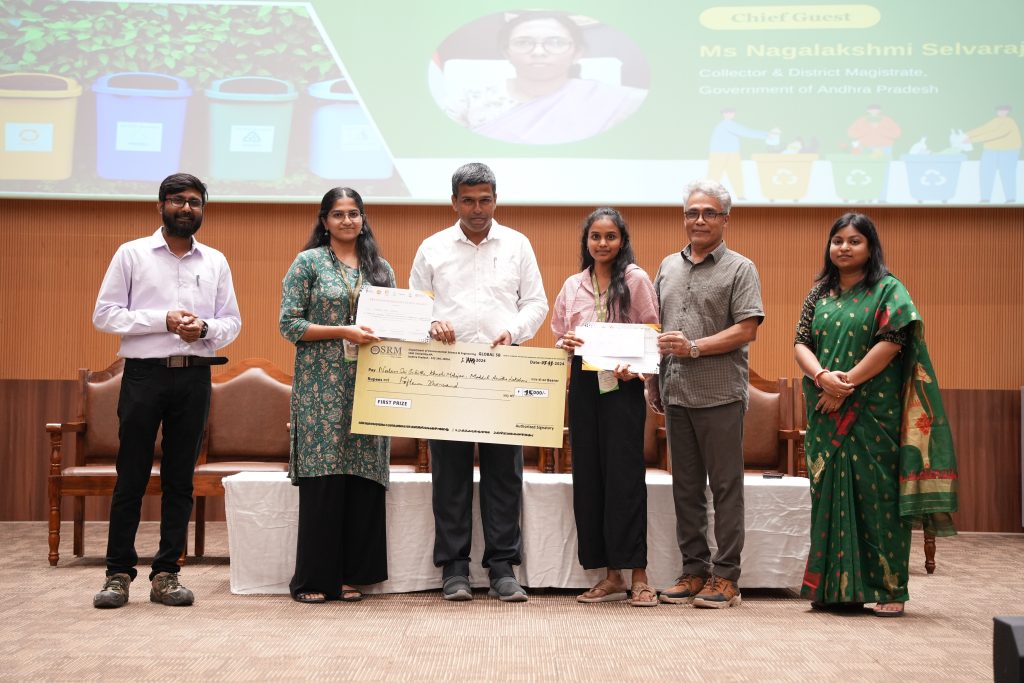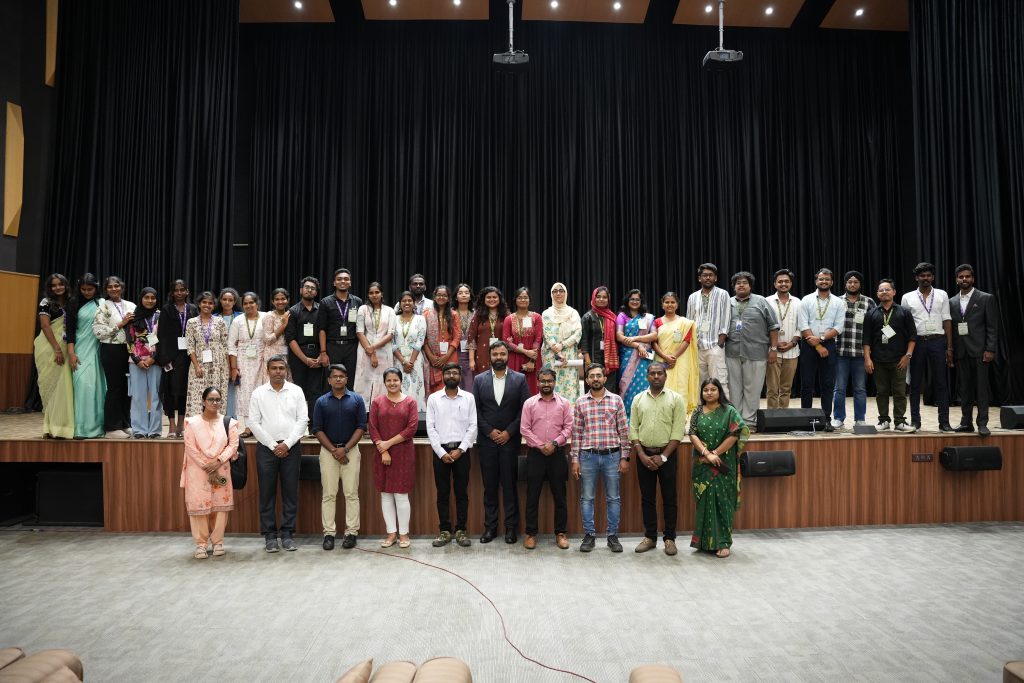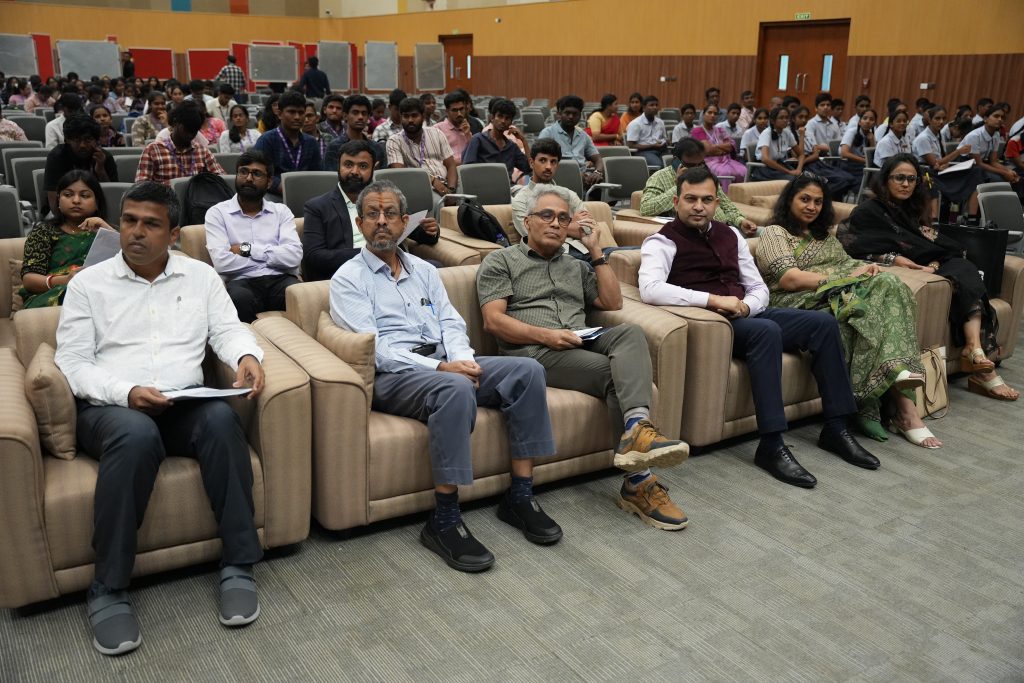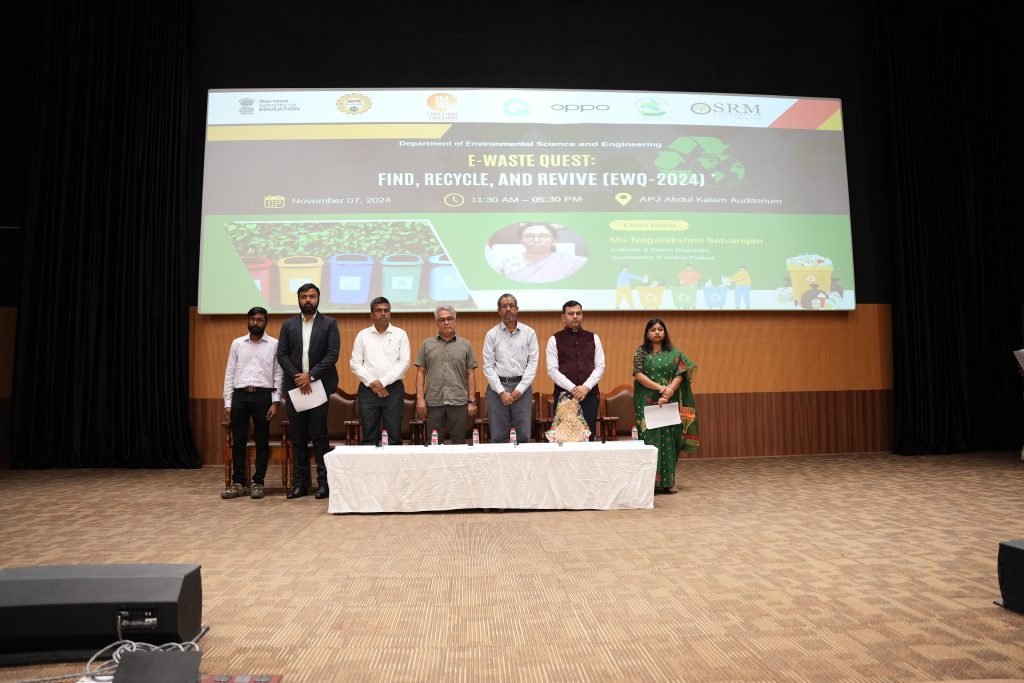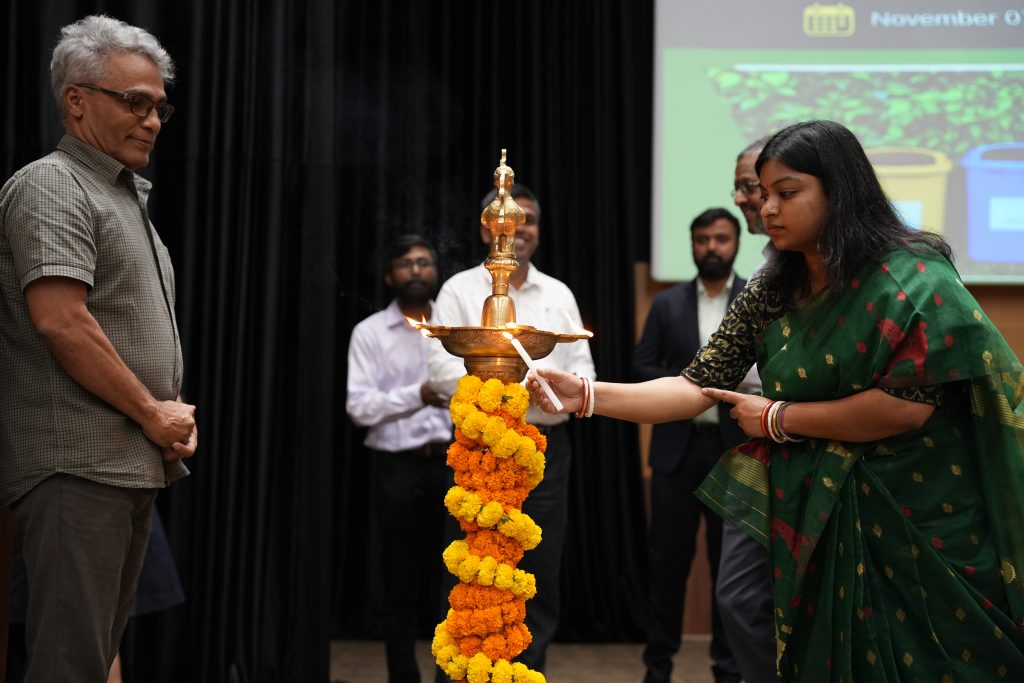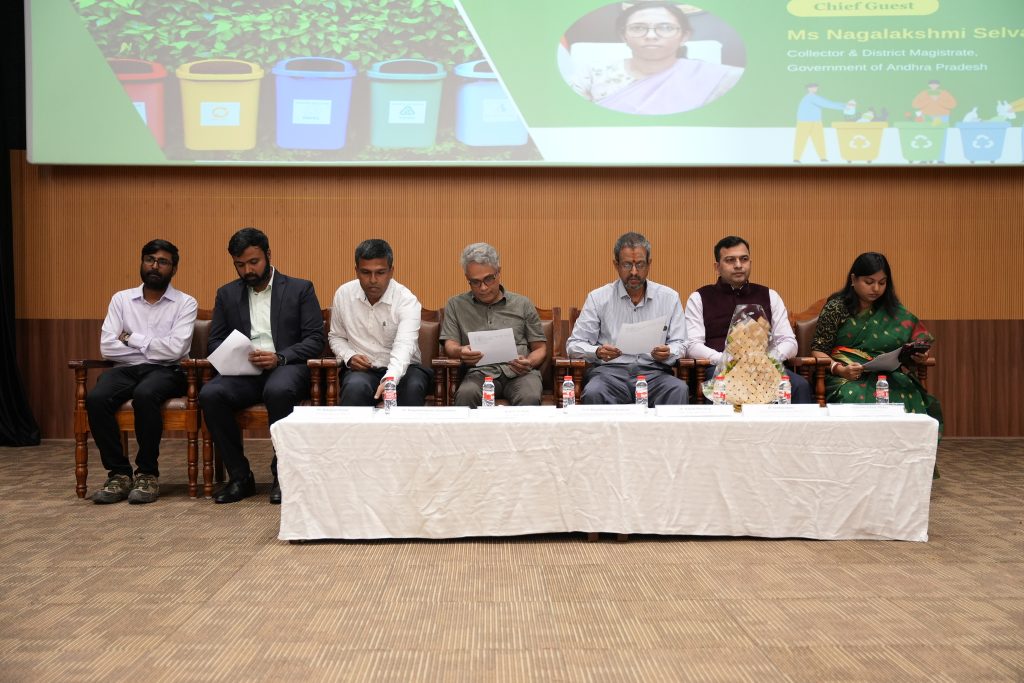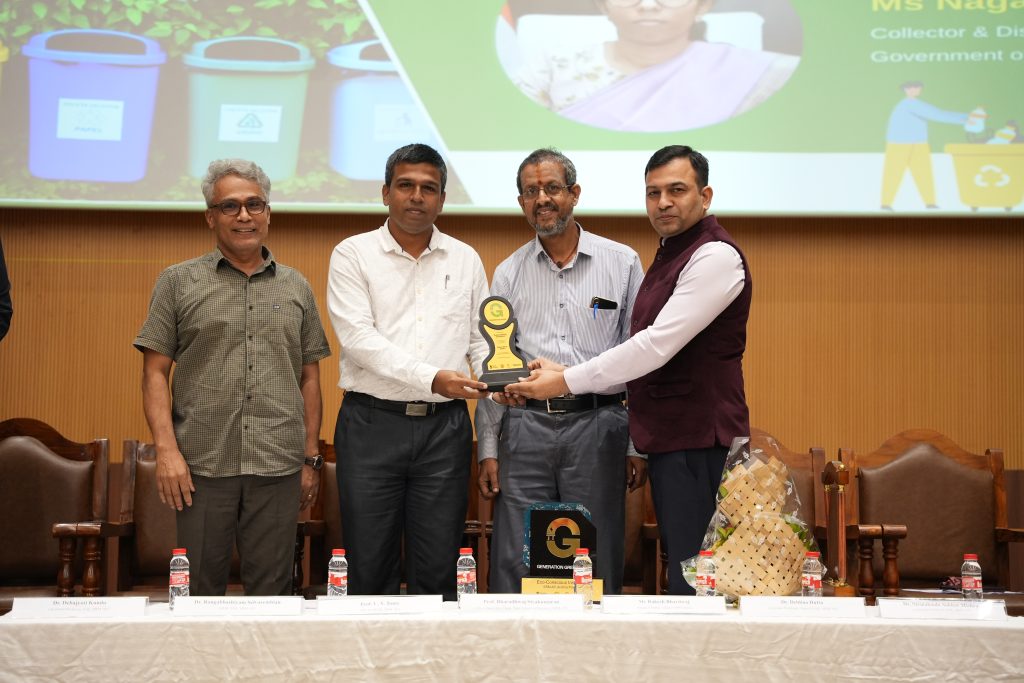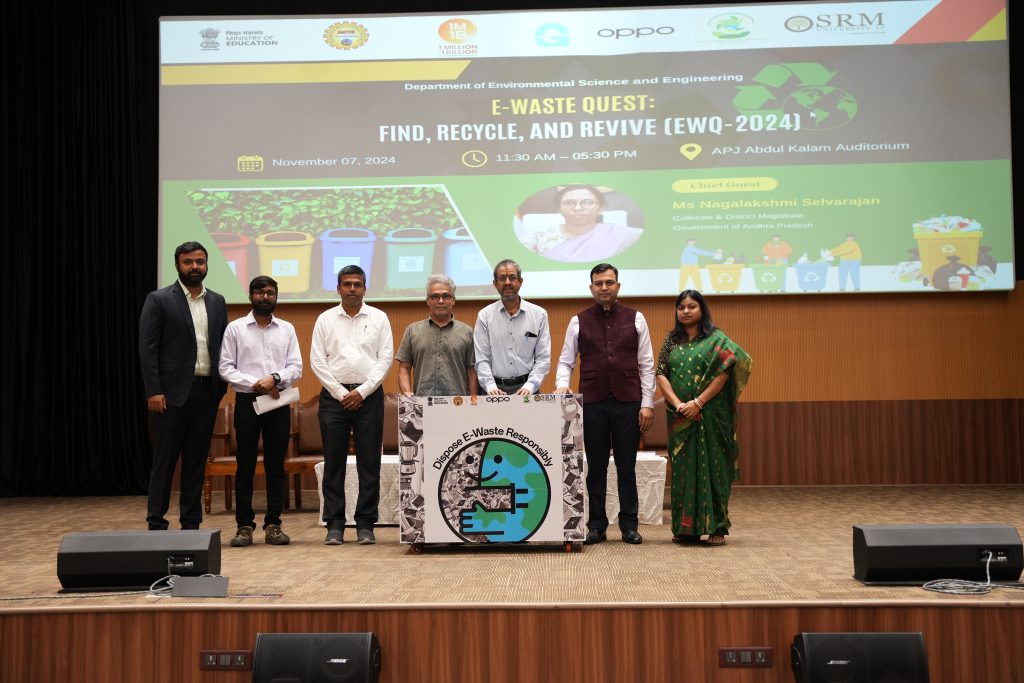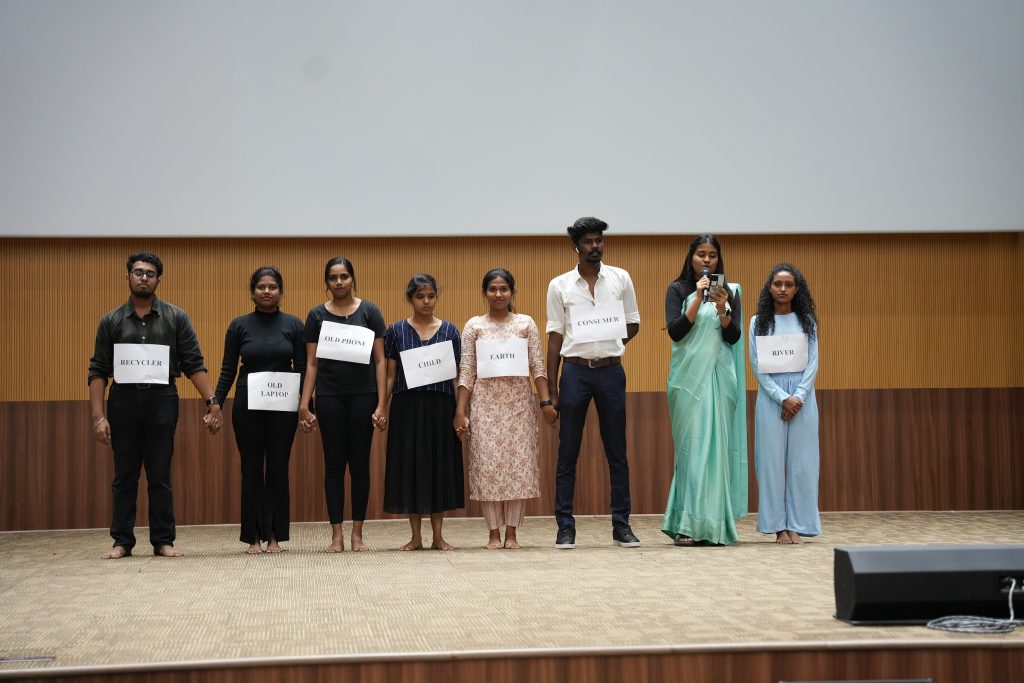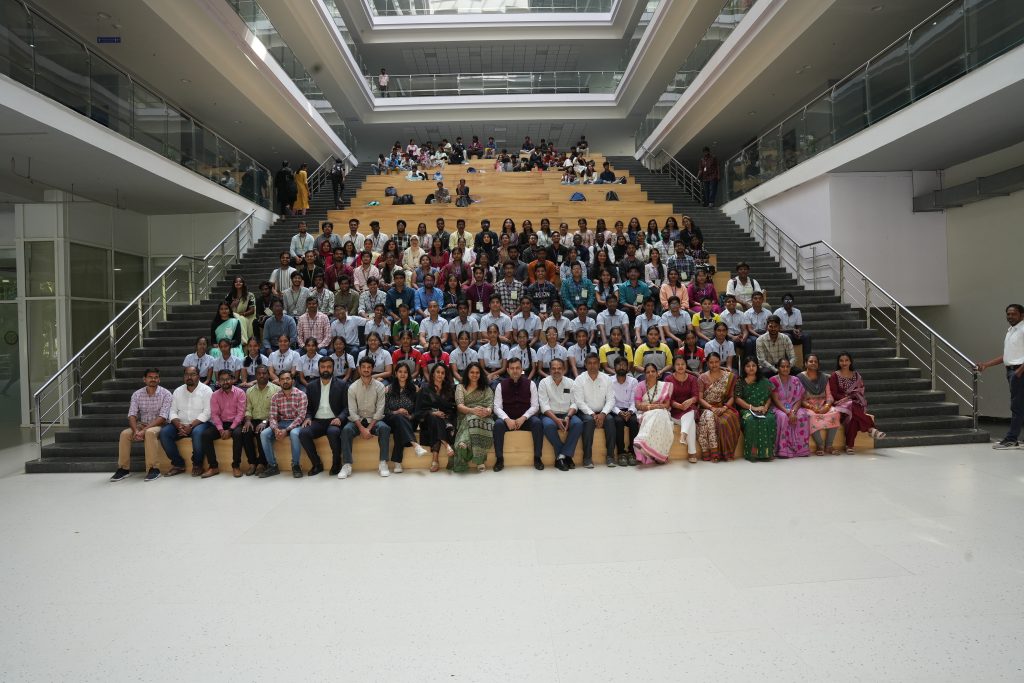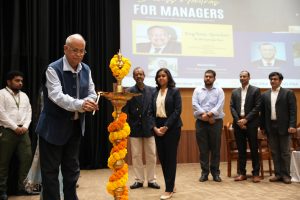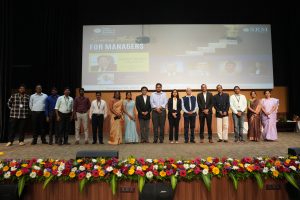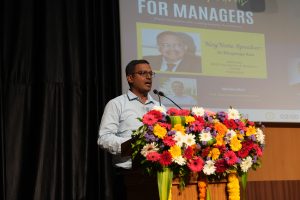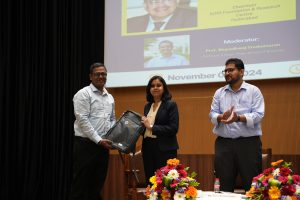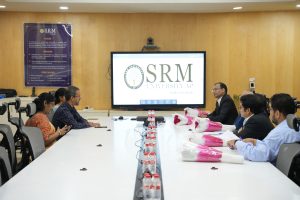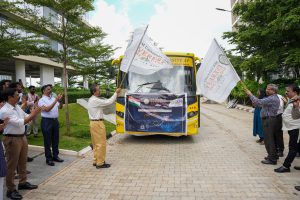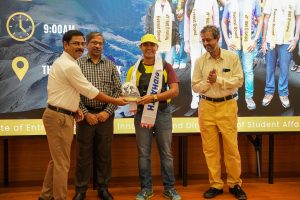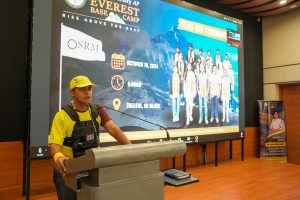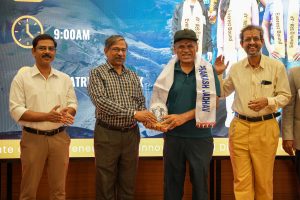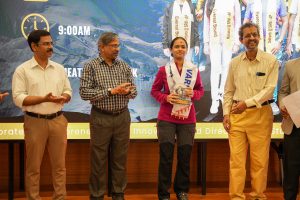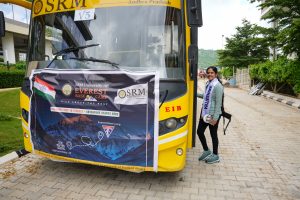CSE Student Publishes in Q1 Journal on Breakthrough Research in Water Technology
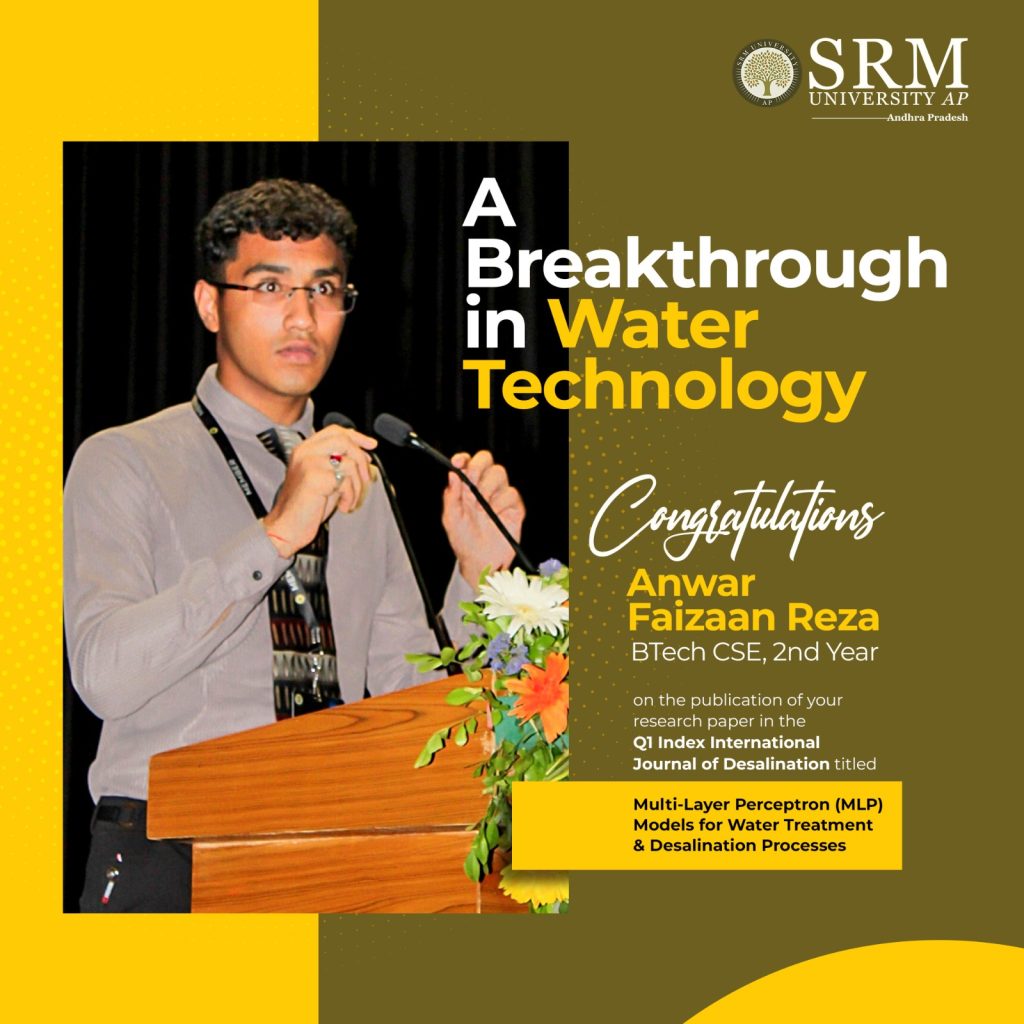
Exemplary student achievements in academia, research and industry are a testament to the excellence nurtured at the SRM University-AP. Mr Anwar Faizaan Reza, 2nd year B.Tech. student from the Department of Computer Science and Engineering has published his research paper in the prestigious Q1 journal Desalination. His paper titled “Multi-Layer Perceptron (MLP) Models for Water Treatment and Desalination Processes” provides a comprehensive review of Multi-Layer Perceptron (MLP) models as innovative tools in water treatment and desalination processes.
With the growing global water scarcity due to increasing population and urbanisation, the study emphasises the need for advanced technologies to optimise water management. Mr Reza discusses how MLPs, a type of artificial neural network, can effectively handle complex, non-linear data, making them suitable for predicting water quality and treatment efficiency.
The paper compares MLPs with traditional models, highlighting their advantages in adaptability and accuracy. It also addresses the limitations of MLPs, such as their dependence on high-quality training data and susceptibility to overfitting. Additionally, the research identifies existing gaps in the application of MLPs in real-world scenarios and suggests future opportunities for integration with other AI techniques and real-time data analysis.
In his paper, Mr Anwar Reza proposes that MLPs can significantly enhance decision-making in water treatment by providing accurate forecasts and optimizing operational processes. He also discusses the importance of developing user-friendly cost estimation tools for desalination projects and advocates for using MLPs in techno-economic assessments. Overall, the paper underscores the potential of MLPs to revolutionise water treatment and desalination, presenting them as vital components in addressing the challenges posed by water scarcity and quality management.
- Published in CSE NEWS, Departmental News, News, Students Achievements
A Strategic Partnership with Multi Commodity Exchange of India Ltd.
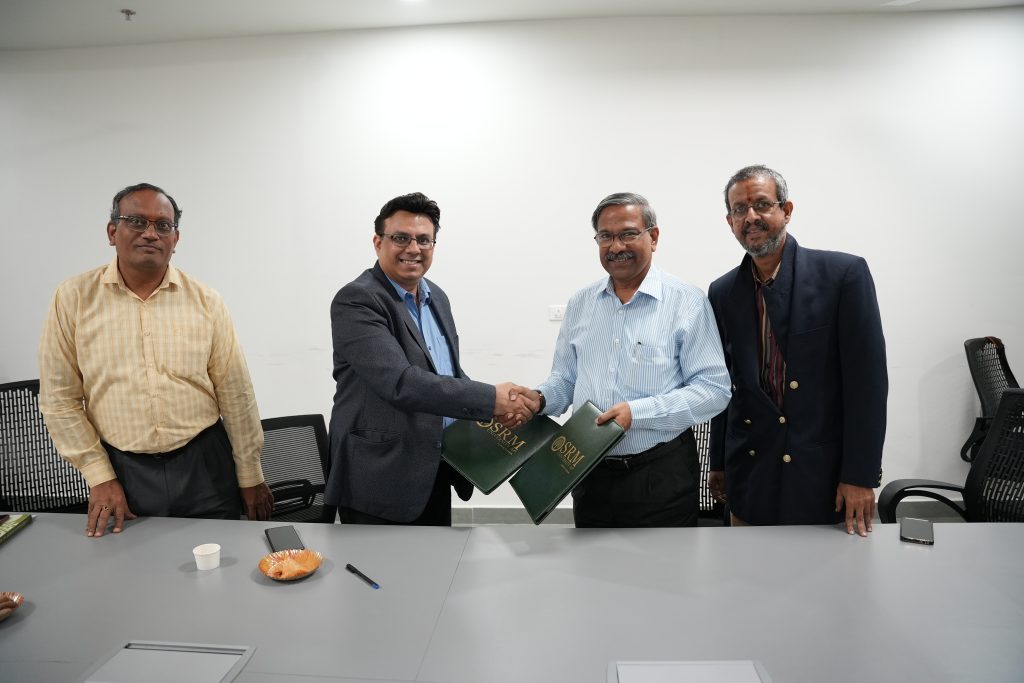
SRM University-AP inked an MoU with Multi Commodity Exchange of India Ltd. (MCX), the largest commodity exchange in the country, to supply highly skilled professionals to meet the industry’s needs. The commodity market plays a vital role in the country’s economic development. Understanding that the industry is expected to create a significant number of job opportunities in the next decade, the university has taken the initiative to partner with MCX to place highly competent graduates at various levels of the company.
The agreement will explore and conduct various interactive sessions, faculty development programmes, research programmes, seminars, conferences and conclaves that would benefit students, faculty and other working professionals. Joint Management Development Programmes (MDP) on the financial / derivatives market, educational conclaves on commodity derivatives inviting participation from other business schools & universities, and events like CONQUEST are some of the initiatives that the MOU manifests.
On the academic front, the MOU agrees that SRM University-AP may launch full/part-time Postgraduate Executive Diploma courses in the Financial /Commodity Derivatives Market with significant input from MCX on the curriculum. The university might also introduce a chapter on “Commodity Derivatives” in its curriculum for the management and commerce programmes. SRM AP will also offer existing courses of MCX, viz. MCX Commodity Professional (MCCP), MCX Certified Index Professional (MCIP) & MCX Certified Options Professional (MCOP) certification(s) as programmes or certification courses under the Paari School of Business.
The partnership with Multi Commodity Exchange of India Ltd. is of grave importance in providing the students and faculty with exposure to the industry, keeping pace with recent market trends, and acquiring an industry-ready skillset.
- Published in Departmental News, MoU, News, Paari Current Happenings
Innovating the Art of Teaching Through Gamification & Game-Based Learning (GBL)
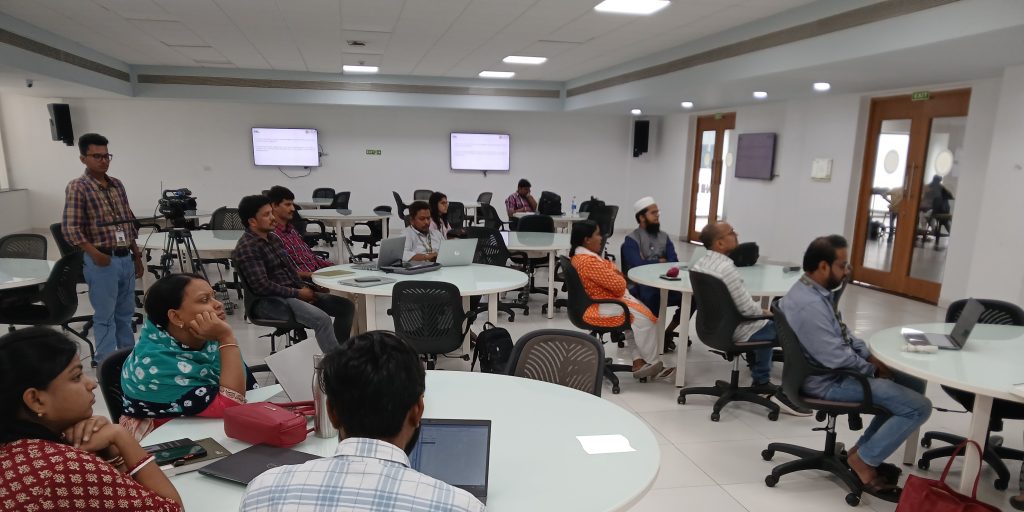
In alignment with the university’s goal to enhance academic excellence, innovation in teaching-learning methods that transgress from non-traditional approaches has taken pivotal importance in academia. To facilitate enhanced and experiential learning experiences for students, the Teaching Learning Centre organised a workshop on “Gamification and Game-based Learning (GBL) in University Education” on November 13, 2024, led by Dr Sunil Chinnadurai, Assistant Professor, Department of Electronics and Communication Engineering. The workshop explored the benefits, challenges, and practical strategies for incorporating Gamification and GBL methods in university-level courses.
The session opened with a discussion on the difference between gamification and game-based learning, two concepts that share similar principles but serve different functions. Gamification, Dr Chinnadurai explained, involves including game-like elements, such as points, badges, and reward systems, in traditional classroom activities. Using these, instructors can transform routine tasks into interactive, motivational experiences for students. Game-based learning, however, takes the concept further by using games as teaching tools. Through this method, students learn by actively engaging in activities that relate to the course matter.
Throughout the workshop, instructors explored how these methods could significantly benefit students. Gamification and GBL have been shown to increase student engagement and actively involve them in learning. This method promotes knowledge skills, boosts creativity, strengthens problem-solving skills, and encourages active participation in the classroom.
The workshop also discussed the practical challenges instructors might face when incorporating GBL and gamification into their courses. Technical issues, student resistance to non-traditional learning methods, and the additional time required for planning were highlighted as common problems. Dr Chinnadurai emphasised the importance of aligning game-based activities with course objectives. Clear rules, along with timely feedback, are essential for creating effective and engaging learning experiences that also meet academic standards.
To provide participants with hands-on experience, the workshop introduced interactive tools such as Kahoot! and Mentimeter, which act as platforms for creating quizzes, polls, and other gamified content. These tools also introduced us to the potential of scenario-based learning.
The workshop highlighted the value of adopting new teaching methodologies in academic pedagogies. As instructors look to enhance their students’ learning experiences, gamification and game-based learning provide promising avenues for making education both rigorous and enjoyable.
- Published in Departmental News, News, Teaching Learning Centre, Workshop
Navigating the Startup Landscape
A Tech Talk was jointly organised by the Paari School of Business and the Directorate of CR & CS. It gave budding entrepreneurs of SRM AP a comprehensive view of building and scaling startups, with practical guidance on MVP development, funding paths, and team expansion through structured hiring practices.
The Talk featuring Aravind Subash, Lead – Talent Acquisition at Increff, as the guest speaker, included engaging exercises such as conducting Extensive Research on Bootstrap Companies in India and Designing a Recruitment Flowchart, which helped students understand the various nuances of being an entrepreneur.
Mr Aravind also shared inputs on investment strategies, highlighting contributions from notable investors such as Kunal Shah (founder of CRED) and Binny Bansal (co-founder of Flipkart).
The insights shared were valuable for young students looking to start, scale, or fund a business in the dynamic startup ecosystem.
- Published in Departmental News, News, Paari Current Happenings
SRM AP Joins OPPO India in its Clarion Call against E-Waste
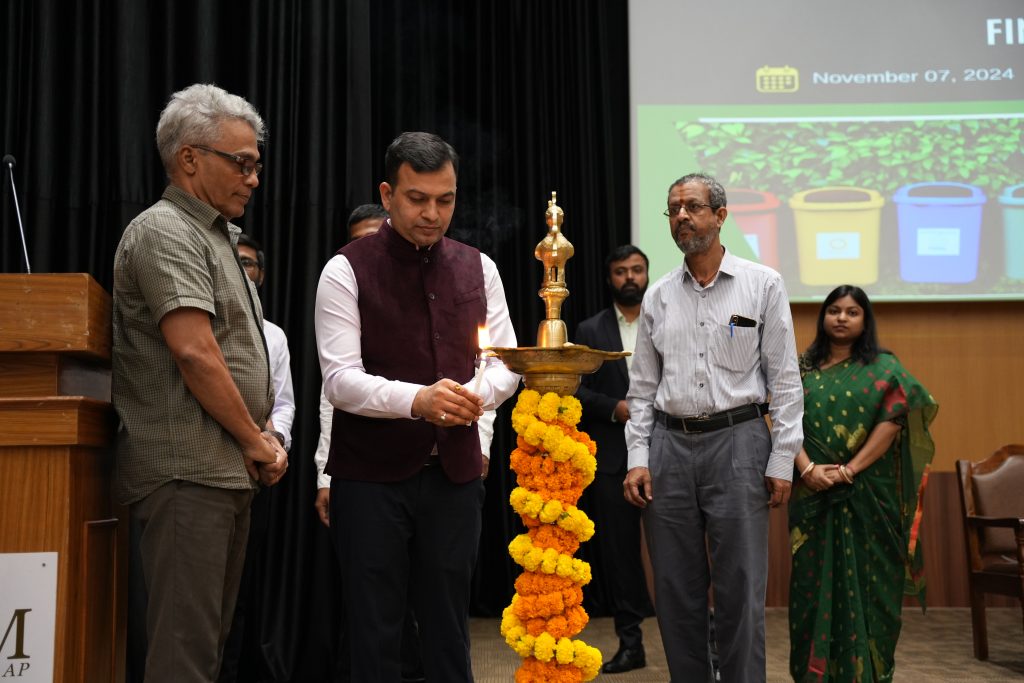 SRM University-AP, in collaboration with OPPO India and the All-India Council for Technical Education (AICTE), is partnering to support “Generation Green”—a national-level initiative aimed at empowering youth to become advocates of sustainability through green skills and actionable commitments. The first phase of the campaign saw AICTE and OPPO India partner with 1M1B to promote sustainable practices among youth by offering green internships to students across India. Launched on July 08, 2024, by AICTE Chairman Prof. T G Sitharam, in the presence of Dr Buddha Chandrasekhar, CCO, AICTE, over 9,000 students from more than 1,400 institutions applied to join the noble venture.
SRM University-AP, in collaboration with OPPO India and the All-India Council for Technical Education (AICTE), is partnering to support “Generation Green”—a national-level initiative aimed at empowering youth to become advocates of sustainability through green skills and actionable commitments. The first phase of the campaign saw AICTE and OPPO India partner with 1M1B to promote sustainable practices among youth by offering green internships to students across India. Launched on July 08, 2024, by AICTE Chairman Prof. T G Sitharam, in the presence of Dr Buddha Chandrasekhar, CCO, AICTE, over 9,000 students from more than 1,400 institutions applied to join the noble venture.
The second phase of the ‘Generation Green’ campaign witnessed SRM AP’s partnership with OPPO and AICTE for educating youngsters about the need for responsible electronic waste management. In alignment with this initiative, the varsity conducted E-Waste Quest 2024, wherein it enlightened students on the issue of waste management of discarded electronic items such as mobile phones, chargers, batteries, and wires. With over 400,000 pledges to date, the campaign now targets one million youth engagements by the end of 2024 to create a lasting impact on e-waste management and environmental preservation. On the occasion OPPO India awarded the SRM University with the title of Eco-Conscious Institution, reflecting the varsity’s commitment to sustainability.
Pro-Chancellor Dr P Sathyanarayanan and Vice Chancellor Prof. Manoj K Arora congratulated the Department of Environmental Science and Engineering for their dedication and commitment to this cause, while Prof. Bharadhwaj Sivakumaran, Dean-Paari School of Business and the officiating Vice Chancellor, emphasised, “Initiatives like the Generation Green Campaign illustrate how small, purposeful actions can catalyse significant change toward a sustainable future.”
Prof. C V Tomy, Dean of the School of Engineering and Sciences, addressed the gathering with an inspiring call to action, stating that every school must have an e-waste collection centre. He stated, “This effort not only promotes responsible disposal but also opens doors to entrepreneurial opportunities, instilling a mindset of sustainability and innovation among students.”
During the launch of the E-Waste Quest 2024, Mr Rakesh Bhardwaj from OPPO India stated, “Today marks a pivotal moment in our collective commitment to a sustainable future. This initiative encourages our youth to take ownership of their role in environmental stewardship.” Dr Rangabhashiyam Selvasembian, Associate Professor and Head-Department of Environmental Science and Engineering, stated, “A motivated and informed generation has the power to reshape our planet. If we do not take responsibility for its protection, no one else will.”
Dr Vinayak Kalluri, Dean-Academic Affairs, implored the youth to fight together in this crusade to save Mother Nature from the horrors of e-waste, noting, “The transition for a sustainable future arises from engaging in small acts of sustainability that result in big transformations.” Additionally, Collector and District Magistrate, Ms Nagalakshmi Selvarajan shared a meaningful message on the importance of community involvement. The E-Waste Quest 2024 served as a powerful reminder that collective efforts help shape a greener future where progress and sustainability go hand in hand.
- Published in Departmental News, ENVS News, News
Understanding the Impact of Sundarbans Mangroves on Global Oceanic Carbon Budgets
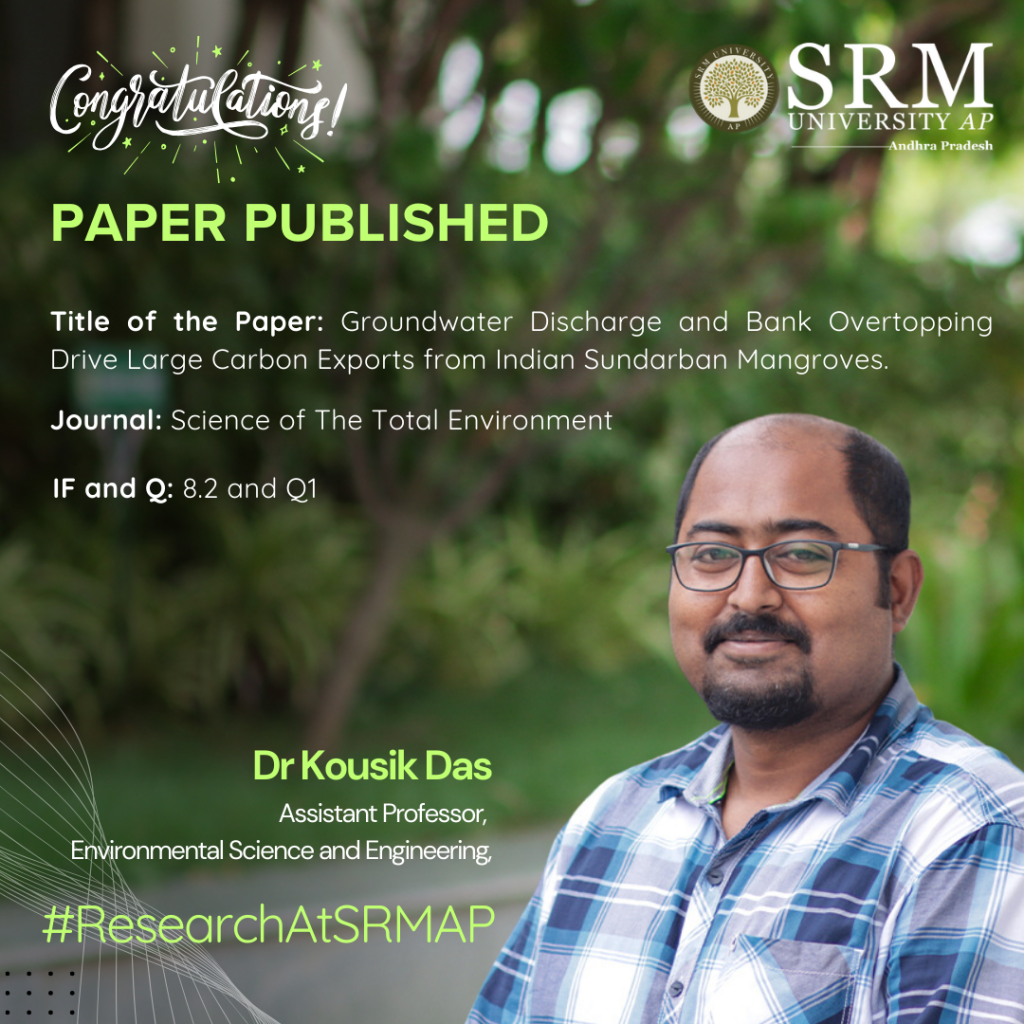
The Sundarbans represent the largest mangrove system on Earth, covering >10,000 km2. These mangroves can export a vast amount of aquatic carbon that can be potentially sequestered for millennia. Dr Kousik Das, Assistant Professor at the Department of Environmental Science and Engineering, collaborates with Southern Cross University, Australia and IIT Kharagpur to conduct breakthrough research to analyse and estimate the carbon flux between the Sunderbans and the Bay of Bengal. He has published a research paper titled “Groundwater discharge and bank overtopping drive large carbon exports from Indian Sundarban mangroves” in the Q1 journal Science of The Total Environment, having an impact factor of 8.2.
Abstract
We estimate porewater-driven carbon exchange between the Sundarbans and the Bay of Bengal using high-resolution time series and a radon groundwater mass balance approach spanning a neap-spring tidal cycle. Submarine groundwater discharge (SGD) increased from neap to spring tides by 352 % up to a maximum of 65.6 cm d−1 largely driven by creek bank overtopping after the mid-tide. Exports of dissolved organic and inorganic carbon and alkalinity doubled between neap and spring, likely due to the ‘first flush’ of older porewater in the mangrove flats. Groundwater discharge was a significant driver of the net carbon export, contributing up to 86.7 % of DIC and 74.0 % of alkalinity during the spring tide while contributing a lower proportion of DOC (4 %–23 %). If these results are representative of the Sundarbans more broadly, carbon fluxes from the Sundarbans would be more than an order of magnitude higher than some of the world’s largest rivers on an areal basis, highlighting the importance of Sundarbans mangroves to global oceanic carbon budgets.
Practical Implementation/Social Implications of the Research
This study shows the global importance of the Sundarbans mangrove system, with significant dissolved inorganic carbon and total alkalinity fluxes to the Bay of Bengal. It also shows that mangrove SGD is an important driver of dissolved inorganic carbon, dissolved inorganic carbon (DIC) and total alkalinity (TAlk) exports and that bank overtopping during mid and spring tides drives a ‘first flush’ of carbon from groundwater. When carbon fluxes from the study site were upscaled to the entire inundated area of the Sundarbans, DIC and TAlk exports were smaller than some of the world’s largest rivers, however when adjusted to the catchment size (assuming the Sundarbans mangrove catchment area is the extent of the mangroves; 10,200 km2), the areal carbon fluxes from the mangroves are more than an order of magnitude higher than these river systems
Dr Das aims to continue his research and further explore the large flux of carbon export due to tropical cyclones from the Indian Sundarbans to the Bay of Bengal.
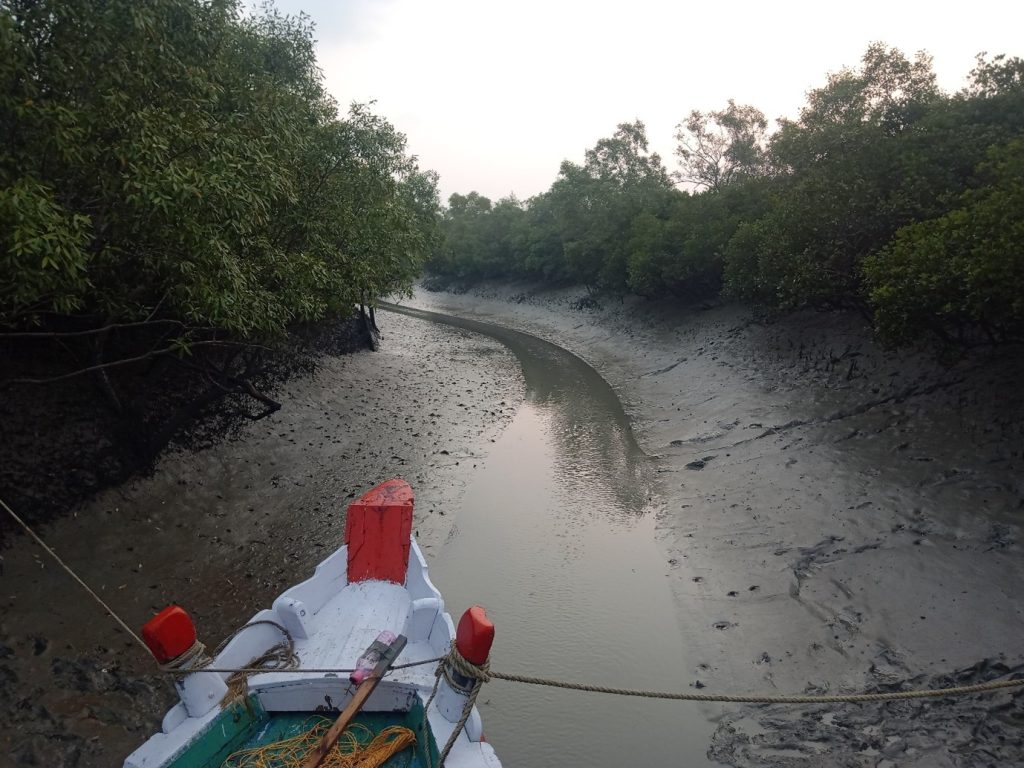
- Published in Departmental News, ENVS News, News, Research News
Industry Experts Inspire Future Leaders at the 2nd Success Mantra for Managers
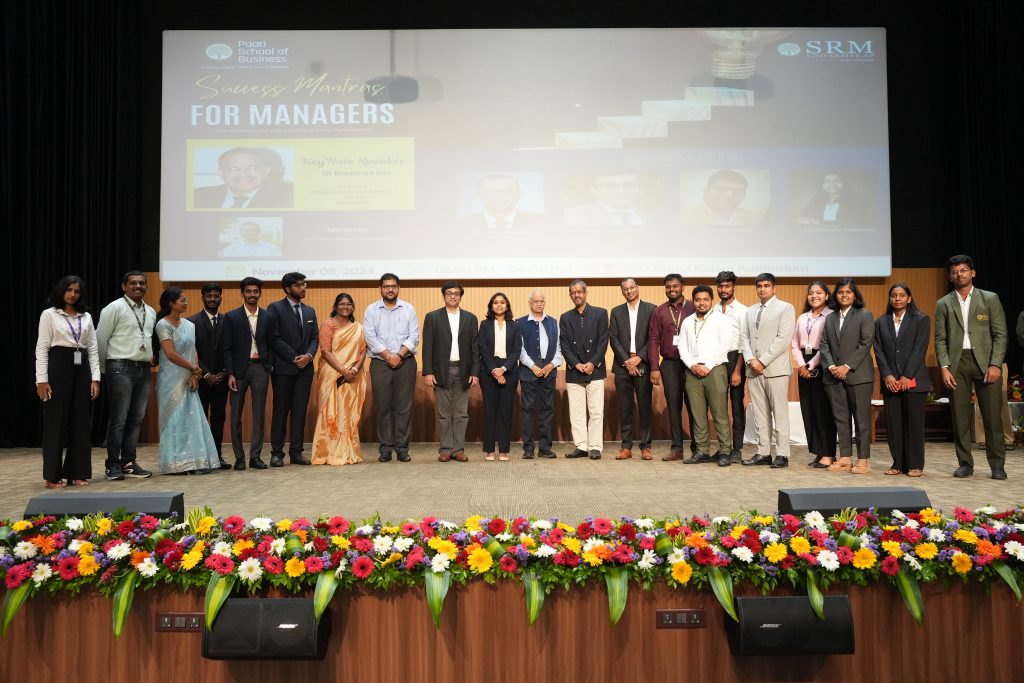
The Department of Management at the Paari School of Business conducted the second edition of its flagship event, “Success Mantra for Managers” (SMM), on November 08, 2024, uniting industry leaders to provide valuable insights, experiences, and professional guidance to students and faculty.
The event, moderated by Prof. Bharadwaj Sivakumar, Dean – Paari School of Business and Officiating Vice Chancellor, featured a distinguished panel that addressed the evolving landscape of management. Panellists shared their unique perspectives on effective leadership, motivation, and the importance of new-age skills in today’s corporate environment.
Ms Srimathi Sridharan, Director-BNY Mellon, remarked,” a manager’s role extends beyond mere target achievement; it fundamentally involves inspiring a team”. She highlighted the significance of kindness in leadership, drawing inspiration from her personal experience as well as the late industrialist and philanthropist, Mr Ratan Tata.
Mr Varun Gupta, Associate Director at PepsiCo, spoke passionately on the idea of Success. He stated, “Define Your Success, Yourself,” and stressed on the necessity for managers and leaders to possess a clear vision. He articulated how a well-defined personal and professional vision can guide managers in reaching their goals while empowering their teams.
Dr Bhujanga Rao, Chairman-KIMS Foundation & Research Centre and the key-note speaker for the discussion shared insightful reflections on his experience with Dr Abdul Kalam. He noted that compassion was a standout quality of Dr Kalam’s leadership, underlining that effective leadership encompasses understanding and supporting team members on both professional and personal levels.
Mr Suresh Ponnuru, Director-Analytics & Strategy Leader at Tiger Analytics, articulated the critical role of a leader in effectively communicating their team’s work to both superiors and clients. He highlighted the importance of perseverance and the ability to seize opportunities as they arise, which are essential traits for successful management.
Additionally, Mr Vinay Mantha, MD, Corporate & Investment Bank at J P Morgan Chase, conveyed that a manager should not only celebrate successes but also embrace failures as learning opportunities. This duality, he suggested, is fundamental to continuous growth and resilience in leadership.
In response to a question about handling success and failures at work, the panellists endorsed the significance of having an alternate plan—plan B if plan A fails. They collectively asserted that leaders must take responsibility for setbacks and implement corrective actions promptly.
The discussion further emphasised the need for managers to constantly evolve and acquire new skills, aligning with the event’s core theme that today’s managerial role must balance high performance with adaptability and empathy. Panellists shared personal anecdotes that underscored the joys and challenges of the profession.
The conversation delved into the relevance of emerging skills, such as artificial intelligence and the necessity for continuous learning, all deemed critical for future managers. Despite the focus on new-age competencies, the panellists unanimously vouched for the enduring value of traditional age-old skills like networking and ability to spot opportunities.
The event aimed at presenting the students with actionable insights and reinforced the vital importance of developing a versatile skill set in preparation for their careers, equipping them to thrive in a dynamic professional landscape.
- Published in Departmental News, News, Paari Current Happenings
A Novel Method to Estimate Parameters in Complex Biochemical Systems
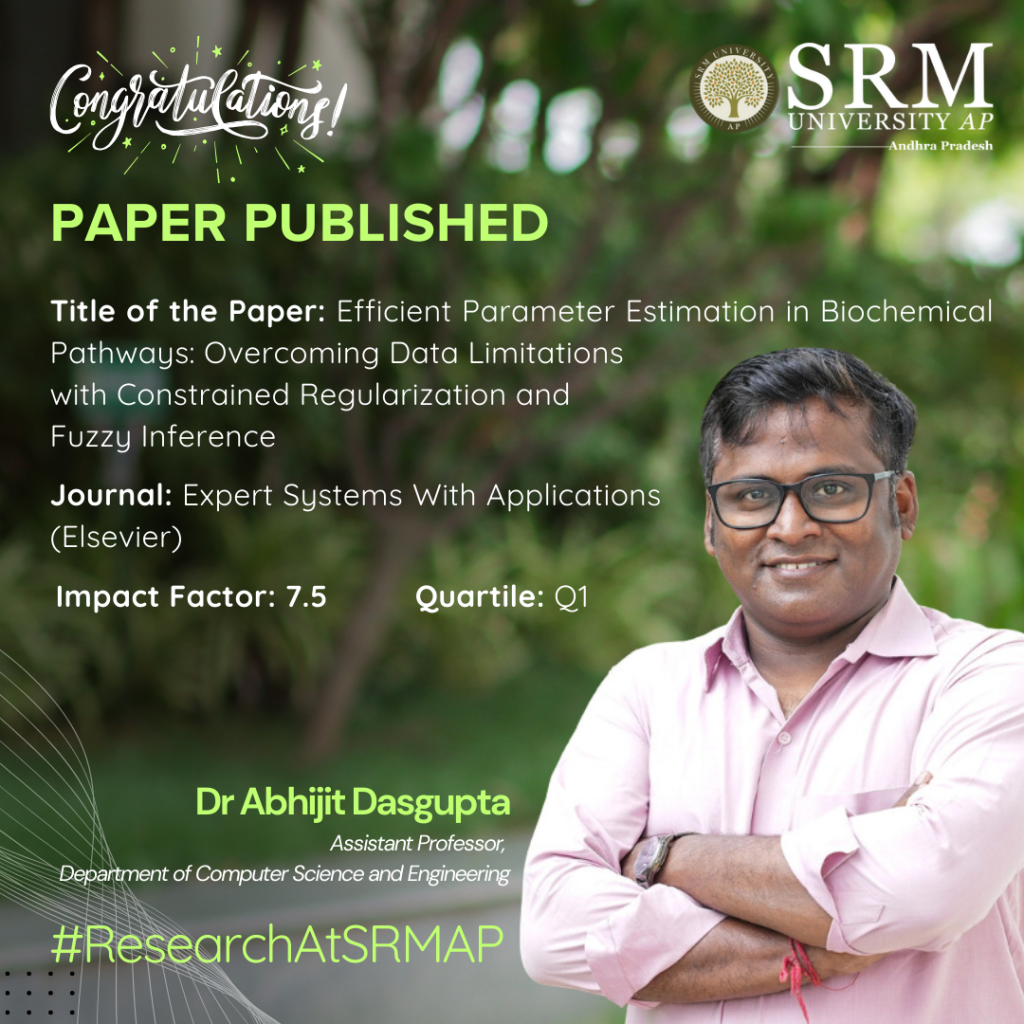
With the advent of cutting-edge technology, Dr Abhijit Dasgupta, Assistant Professor at the Department of Computer Science and Engineering, has conducted breakthrough research in understanding biochemical systems with limited data in hand. His research has been published as a paper titled “Efficient Parameter Estimation in Biochemical Pathways: Overcoming Data Limitations with Constrained Regularization and Fuzzy Inference” in the Elsevier journal Expert Systems With Applications, having an impact factor of 7.5.
Abstract
This study introduces a new method to estimate parameters in biochemical pathways without relying on experimental data. The method called the Constrained Regularized Fuzzy Inferred Extended Kalman Filter (CRFIEKF) uses fuzzy logic to estimate parameters based on known but imprecise relationships between molecules. To handle complex and unstable data, the method incorporates Tikhonov regularisation, improving accuracy and stability. CRFIEKF was tested on several pathways, including glycolysis and JAK/STAT signalling, and reliable results were obtained. This approach offers a useful tool for estimating parameters in complex biochemical systems, especially when experimental data is limited.
Explanation of the Research in Layperson’s Terms
This research is about finding a new way to predict how living cells work, especially when scientists don’t have enough data from experiments. Normally, to understand how cells function, scientists need to collect a lot of information over time, which can be costly, difficult, or even impossible.
To solve this, the researchers developed a new method that doesn’t need as much experimental data. Instead of relying on exact measurements, their method uses fuzzy logic, which is like making smart guesses based on patterns and relationships we know, even if we don’t have perfect information. They also used a technique to keep these guesses steady and reliable, even when the data is messy or incomplete.
They tested this method on different biological processes, such as how cells turn food into energy (a process called glycolysis) and how cells send signals using proteins (like in the JAK/STAT pathway). The method worked well and gave accurate results.
In simple terms, this research helps scientists predict how cells behave without needing a lot of expensive and hard-to-get data, making it easier to study the complex systems inside living organisms.
Practical Implementation/Social Implications of the Research
The practical implementation of this research lies in its ability to accurately predict how biological systems, such as cells, function without relying heavily on time-consuming and costly experimental data. This method can be applied in various fields, including drug development, personalised medicine, and agriculture, where understanding complex biological processes is crucial. For instance, pharmaceutical companies could use this technique to model how a drug will interact with different biological pathways, speeding up the drug discovery process. Similarly, it could help tailor medical treatments to individual patients by predicting how their unique biological makeup will respond to specific therapies.
The broader social impact of this research is significant. By reducing the need for extensive experimental data, this method can lower the cost and time required for scientific discoveries in healthcare and biotechnology. This could lead to faster development of new medicines, more affordable healthcare solutions, and personalised treatments that improve patient outcomes. In agriculture, this method can help optimise crop growth and resilience, contributing to food security. Overall, this research provides a pathway for more efficient and cost-effective advancements in biology, healthcare, and environmental sciences, ultimately benefiting society by improving health and sustainability.

Collaborations
1. St Jude Children’s Research Hospital, Memphis, USA
2. University of California, San Diego, USA
3. Columbia University, New York, USA
4. Nantes Université, France
5. University of North Carolina at Chapel Hill, USA
6. Institute of Himalayan Bioresource Technology, Palampur, India
7. Indian Statistical Institute, Kolkata, India
8. Aliah University, Kolkata, India
9. Michelin India Private Limited, Pune, India
10. Gitam University, Bangalore, India
Future Research Plans
Building on the foundation laid by this research, the next steps will involve expanding its applications to more complex biological systems and personalised medicine. The following outlines a future roadmap:
1. From Time-Course Data to Pathway Enrichment and Single-Cell Modeling:
The current method, which estimates parameters without relying on time-course data, can be adapted to use time-course data when available. Time-course data captures how biological processes change over time, offering valuable insights. By integrating this data, we can refine the parameter estimation and achieve a more precise pathway enrichment analysis. This approach can be particularly beneficial in single-cell studies, where understanding the variability in cellular responses within complex diseases like cancer, diabetes, or neurodegenerative disorders is crucial. Modelling these pathways at the single-cell level will enable us to capture heterogeneity within tissues and improve disease understanding.
2. Simulating Pathways to Identify Drug Targets:
Once the pathways are enriched and modelled, we can simulate these biological networks to predict how different interventions—such as drugs—might influence the system. This simulation can help identify potential drug targets, particularly those that are critical in disease progression. For instance, by manipulating the modelled pathways, we can observe how specific proteins or molecules influence the disease state, providing insights into where a drug could be most effective.
3. Predicting Drug Side Effects:
After identifying potential drug targets, the next step is to predict the side effects of these interventions. The same model can simulate unintended consequences by analysing how modifying a target impacts other connected pathways. This simulation can provide early warnings about potential side effects, reducing the risk during later stages of drug development. Understanding these off-target effects at an early stage will be crucial for designing safer drugs.
4. Predicting Drug Molecules Using Generative Adversarial Networks (GANs):
Incorporating machine learning, particularly Generative Adversarial Networks (GANs), can take this research to the next level. GANs can be trained to generate new drug molecules by learning from existing drug databases. By feeding the pathway model’s identified targets into the GAN, we can generate candidate drug molecules that are predicted to interact with these targets effectively. This approach can significantly speed up the drug discovery process by automating the design of new drug candidates tailored to specific biological pathways.

5. Integration with Omics Data for Personalized Medicine:
The future of personalised medicine relies on integrating various layers of biological data—such as genomics, transcriptomics, proteomics, and metabolomics—into a cohesive model. By integrating pathway data with these other “omics” layers, this research will facilitate a more comprehensive understanding of individual patient biology. This integration allows for tailored treatment strategies, making personalised medicine more achievable. For instance, based on an individual’s genetic makeup and biological pathways, we can predict how they will respond to specific drugs and design personalised therapies with minimal side effects.
6. Pathway-Based Drug Design and Validation:
Once potential drug molecules are identified using GANs, they can be simulated within the enriched pathways to test their efficacy in silico. These simulations will allow researchers to understand how the drug interacts with the target pathway and its downstream effects. If the simulation shows promising results, the drug candidates can be prioritised for lab testing and clinical trials. This systematic approach, from modelling to simulation, could drastically reduce the time and cost associated with traditional drug discovery processes.
Summary
This plan transforms the current research from a powerful parameter estimation technique into a comprehensive framework for personalized medicine and drug discovery. By expanding to time-course data, single-cell modeling, pathway simulation, and integrating cutting-edge AI techniques like GANs, we can predict drug molecules tailored to individual biological systems. This personalized approach not only streamlines drug discovery but also enhances the safety and effectiveness of treatments, paving the way for more efficient and precise medical interventions.
- Published in CSE NEWS, Departmental News, News, Research News
Environmental Sustainability in Corporate Business Firms of Ghana
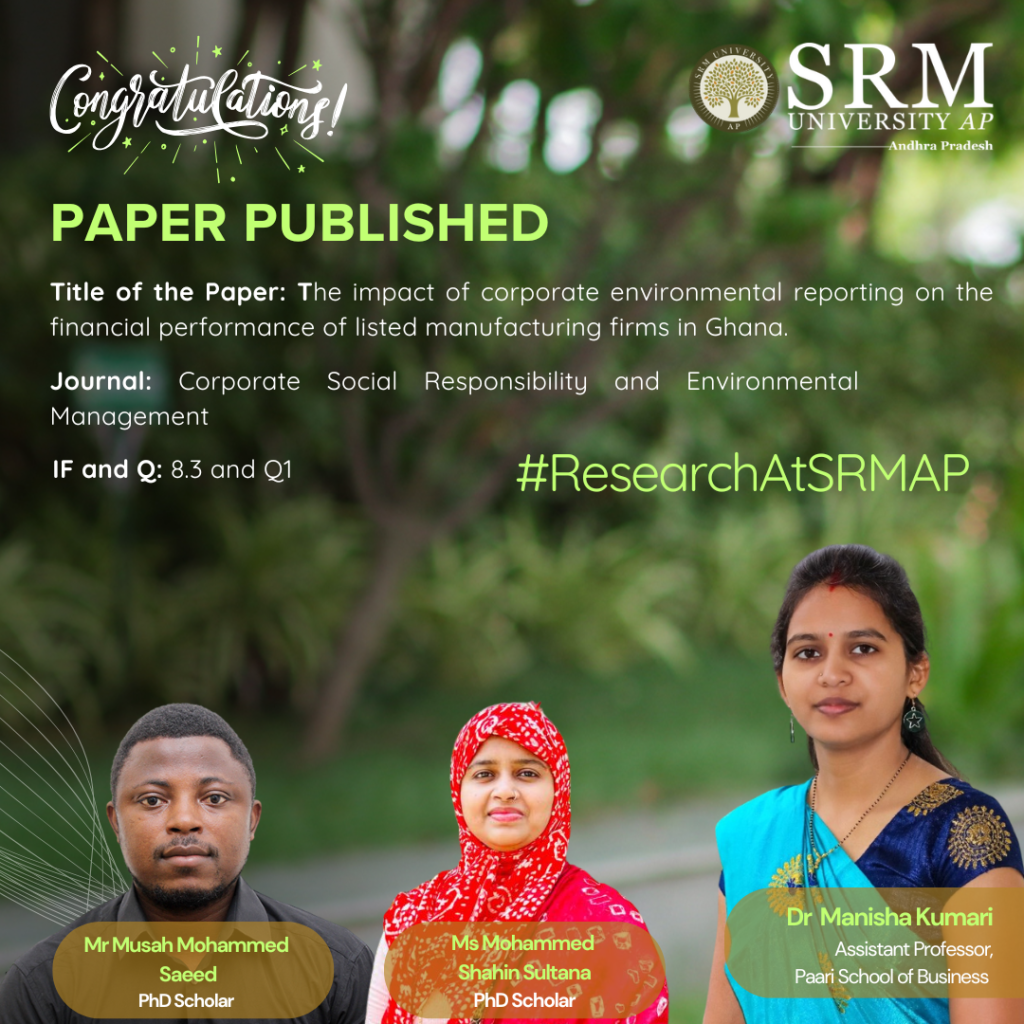
It is pivotal for multinational companies to opt for sustainable growth while expanding their domains. In this regard, Dr Manisha Kumari, Assistant Professor from the Department of Management, Paari School of Business, has published her paper titled “The Impact of Corporate Environmental Reporting on the Financial Performance of Listed Manufacturing in Ghana” along with her research scholars Mr Musah Mohammed Saeed and Ms Mohammed Shahin Sultana in the Q1 journal Corporate Social Responsibility and Environmental Management with the impact factor 8.3.
Abstract
A growing number of businesses are facing criticism for engaging in environmentally damaging practices. Despite advancements in technology and operational efficiency, the environmental challenges confronting businesses have become increasingly urgent. As disclosure requirements have expanded, the importance of reporting standards for environmental sustainability has risen. This study explores the impact of corporate environmental reporting on the financial performance of listed manufacturing firms in Ghana. It analyses ten years (2012-2021) of annual reports from 20 publicly traded manufacturing companies, using panel regression and content analysis to assess the data. The findings reveal that environmental sustainability disclosure (ENVD) has a positive and significant effect on return on equity (ROE) and net profit margin (NPM). Furthermore, disclosures related to health, safety, and community development initiatives have a strong positive impact on ROE. The study recommends that policymakers develop guidelines, especially for environmental reporting, to aid firms in preparing their annual reports. It also suggests that corporate accountants expand their expertise and collaborate with environmental and ecological experts. This research offers valuable insights for policymakers and provides a foundation for further investigation into the effects of corporate environmental reporting (CER) on the performance of listed firms in sub-Saharan Africa.
Explanation of the Research in Layperson’s Terms
In simple terms, this study looks at how companies are being criticised for harming the environment, even though they have access to better technology and more efficient ways of working. Environmental problems for businesses are getting more serious, and as governments and organisations require companies to share more information about how they affect the environment, the standards for reporting this information have become more important.
The research focuses on how reporting environmental activities affects the financial success of manufacturing companies in Ghana. It examines reports from 20 publicly traded companies over ten years (2012-2021). The analysis shows that companies that disclose their environmental efforts, such as how they manage health, safety, and community projects, tend to have better financial outcomes, particularly in terms of the profit they return to shareholders and how much profit they make overall.
The study recommends that governments create clear guidelines for environmental reporting to help companies include this information in their annual reports. It also suggests that accountants should work more closely with environmental experts to improve their knowledge. The research provides important information for policymakers and encourages further exploration into how reporting on environmental activities affects company performance in Africa.
Practical Implementation/Social Implications of the Research
The study shows that environmental sustainability disclosures (ENVD) positively impact net profit margin (NPM) and return on equity (ROE) but have minimal effect on return on assets (ROA). This emphasises the need for stricter regulations to ensure comprehensive sustainability reporting, with policymakers incentivising better practices to boost financial performance.
- Energy disclosure (END) positively affects NPM, ROA, and ROE, suggesting mandatory energy-efficiency reporting. Regulators should set standardised metrics and offer tax incentives to encourage energy-efficient technologies.
- Mandatory environmental reporting by companies can help achieve environmental goals, gain importance in securing trade partnerships, and attract global capital.
- Health and safety disclosures (HSD) improve financial metrics, underscoring the need for stricter workplace safety regulations and rewarding safety-focused companies to enhance both worker safety and financial outcomes.
- Community involvement disclosure (CID), which has a negative but insignificant effect on financial performance, highlights the need for standardised reporting and alignment with core business strategies to show long-term value.
- To boost transparency, integrated reporting should be adopted nationwide, embedding environmental and social disclosures into financial reports to better demonstrate their long-term impact. Strengthening Ghana’s weak regulatory framework and aligning it with international standards (e.g., IFRS S1 and S2) would improve corporate social responsibility (CSR) practices, particularly in community development.
- Fiscal incentives, such as tax breaks, could encourage firms to invest in long-term sustainability projects, such as education and healthcare. Capacity building within firms, including sustainability training, would improve both financial and environmental outcomes.
- Standard method of accounting for environmental reporting can bring consistency in the market. Also, they required a proper set of guidelines that can attract environmental investors.
Overall, policy reforms focused on transparency, regulation, and aligning sustainability with financial goals would significantly benefit Ghana’s corporate sector.
Future Research Plans
Dr Manisha plans to shift her focus from traditional accounting standards to the growing field of sustainability reporting. This transition aligns with the increasing global emphasis on environmental, social, and governance (ESG) issues, which have become central to corporate accountability and transparency. Sustainability reporting has been a topic of ongoing discussion, reflecting the need for businesses to disclose not only their financial performance but also their impact on the planet and society.
- Published in Departmental News, News, Paari Current Happenings, Research News
1st Private University in India to Send a Student Expedition to Mt. Everest Base Camp
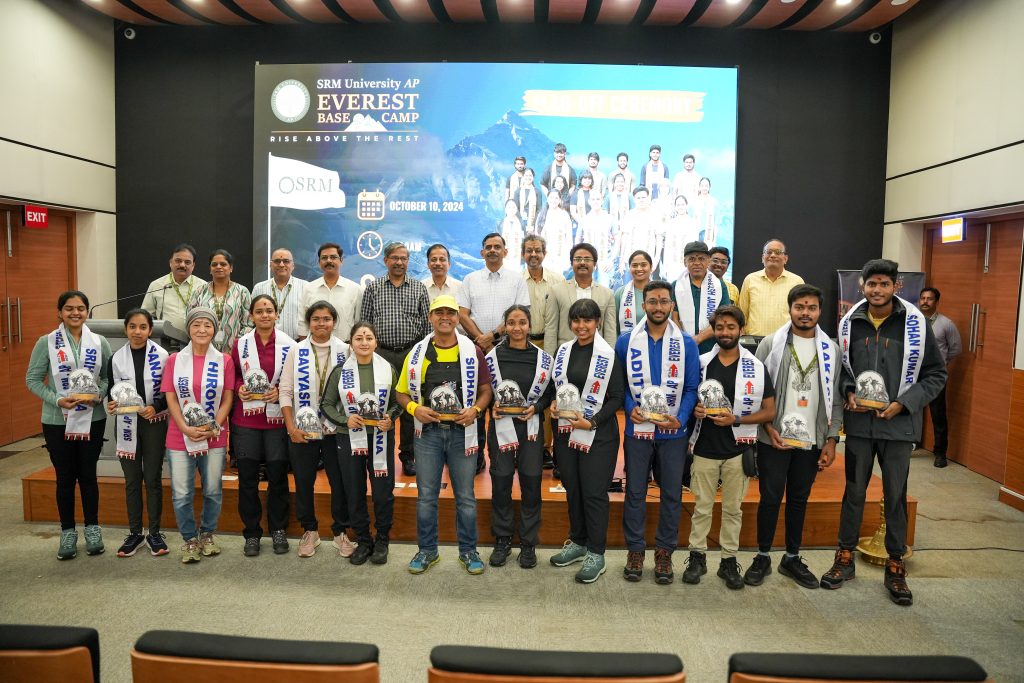
SRM University-AP flagged off the much-awaited Everest Base Camp Expedition that will take place from October 12 – 27, 2024. This is India’s first initiative by any private university in India to send a team of 18 students and faculty under the leadership of Mr Sidharth Tripathy, Director-Entrepreneurship and Innovation, to conquer Mt. Everest Base Camp. The audacious adventure was flagged off by Dr R Premkumar, Registrar, and Prof. Bharadhwaj Sivakumaran, Dean of Paari School of Business, in the presence of Mr Anil Kumar Nigam, Director-Student Affairs, Mr Udayan Bakshi, Associate Director-Entrepreneurship & Innovation, Prof. C V Tomy, Dean-SEAS and the cheering students of the university.
“To enhance the quality of entrepreneurship, it is pivotal to foster a mindset that can take risks, tackle huge challenges and overcome tribulations from a broader perspective. Our motive as a 21st-century university is to cultivate this mindset through this thrilling adventure and to become the harbingers of transformation among students,” remarked the expedition leader, Mr Sidharth Tripathy. The 15-day exhilarating expedition jointly organised by the Directorate of Entrepreneurship & Innovation and the Directorate of Student Affairs will begin from Kathmandu and will reach Everest Base Camp, covering a distance of about 134 km and scaling a height of 17,598 ft.
In his address to the voyagers, Dr R Premkumar wished the group a safe and successful journey and opined, “This is an adventure of a lifetime that will teach you to live as a group, to grow as a team and contribute to each other for a common goal”. In addition to providing students with exemplary academic, research and entrepreneurial resources, SRM University-AP also emphasises the significance of nurturing 21st-century skills through experiential projects and initiatives. The Everest Base Camp expedition is a one-of-a-kind adventure that will ensure that students imbibe the value of belief, the significance of planning, training and camaraderie to develop essential leadership skills.
- Published in Departmental Events, IDEA NEWS, News, student affairs news


